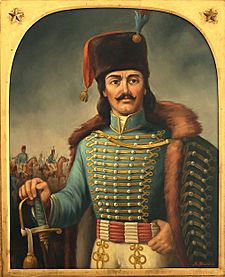Michael Kovats de Fabriczy facts for kids
Quick facts for kids
Michael Kovats de Fabriczy
|
|
|---|---|
 |
|
| Birth name | Kováts Mihály |
| Born | 1724 Karcag, Habsburg Monarchy |
| Died | May 11, 1779 Charleston, South Carolina, U.S. |
| Buried |
Charleston, South Carolina (Field of Battle)
|
| Allegiance | |
| Service/ |
|
| Rank | Colonel Commandant |
| Unit | Pulaski's Legion |
| Awards | |
Michael Kovats (born Kováts Mihály in 1724) was a brave Hungarian soldier. He became a cavalry officer and fought for America in the American Revolutionary War. He died in battle on May 11, 1779. Many people call him and General Casimir Pulaski the "Founding Fathers of the US Cavalry."
Contents
Early Life and Military Training
Michael Kovats was born in Karcag, Hungary, in 1724. He came from a noble family. He started his military career as an officer in the Hungarian cavalry. He served under Empress Maria Theresa. Later, he joined the Prussian Army and became a captain in their cavalry. He served under King Frederick the Great. He even earned a very important award called the Pour le Mérite.
Offering Help to America
In 1777, Michael Kovats learned about the American Revolution. He decided to offer his military skills to the United States. He wrote a famous letter to Benjamin Franklin, who was the American ambassador in France.
In his letter, Kovats wrote that freedom is more valuable than gold. He explained that he was a free man from Hungary. He had been trained in the Royal Prussian Army. He started as a low-ranking soldier and worked his way up to captain. He learned a lot about training soldiers and leading them in battle. He wanted to help the American cause.
Kovats told Franklin that he had traveled a long way to offer his help. He was ready to fight and even die for American freedom. He asked Franklin for a special pass and a letter of recommendation for the American Congress. He also mentioned that other companions were planning to join him.
Joining the Continental Army
When Kovats arrived in America, he joined General Casimir Pulaski. Pulaski was in charge of George Washington's cavalry. At that time, the American cavalry was not very well trained. There were not many experienced cavalry officers.
On February 4, 1778, Pulaski suggested a plan to create a special training division for cavalry soldiers called hussars. He wrote to Washington, saying that Kovats was a skilled officer. Pulaski believed Kovats was perfect for the job. On March 19, Pulaski again recommended Kovats to Washington. He said Kovats had been a colonel in the Prussian army.
The Continental Congress officially formed Pulaski's Legion on March 28, 1778. Michael Kovats was made the colonel commandant of this legion on April 18, 1778. His main job was to organize and train hussar regiments for the American army.
Training and Battle
Kovats immediately began recruiting men. By October 1778, his legion had 330 officers and soldiers. He trained these men using the methods of the Hungarian hussars. Their training and organization were similar to European cavalry units.
In October, Pulaski's Legion moved to New Jersey. They fought against the British at Osborne Island on October 10 and at Egg Harbor on October 14. As winter approached, the legion went to Cole's Fort for more training.
On February 2, 1779, the army marched to South Carolina. They were going to join General Benjamin Lincoln's forces. During the long march, many soldiers got sick with smallpox. Only 150 soldiers reached Charleston. More than half of the legion had died from disease.
The Siege of Charleston was happening when they arrived. The situation was very difficult. Pulaski's legion arrived on May 8, 1779. On May 11, they attacked the British troops led by General Prevost. The attack was not successful. During this battle on May 11, 1779, Colonel Michael Kovats was killed while fighting for American independence. He was buried where he fell on the battlefield.
Legacy and Remembrance
Michael Kovats's bravery and dedication are still remembered today. A phrase from his letter to Benjamin Franklin, "Most Faithful unto Death" (Fidelissimus ad Mortem), became the motto of the American Hungarian Federation.
On May 11, 1779, Colonel Kovats gave his life for American freedom. He was leading the Continental Army cavalry he had trained.
Today, cadets at The Citadel Military College in Charleston, South Carolina, honor Michael Kovats. A part of their campus is named after him. The Hungarian Embassy in Washington, D.C., also has a statue of him.
During World War II, a Liberty Ship was named SS Michael de Kovats in his honor.
 | Toni Morrison |
 | Barack Obama |
 | Martin Luther King Jr. |
 | Ralph Bunche |

